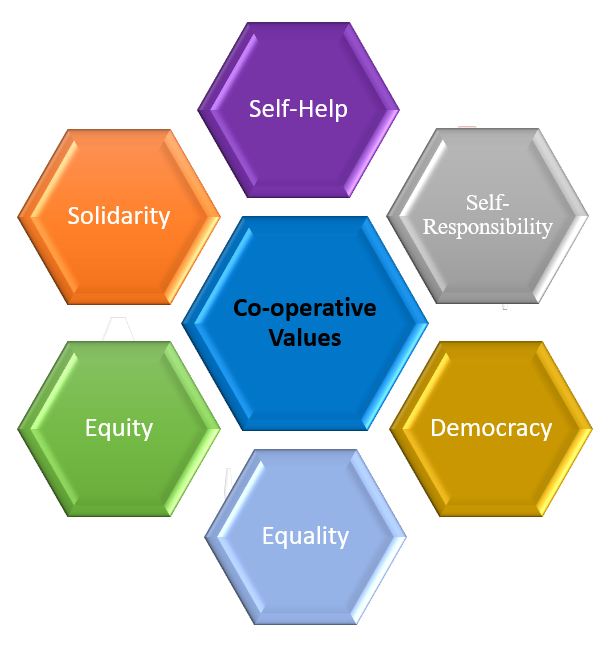What is a Co-operative?
A co-operative is an autonomous association of persons united voluntarily to meet their common economic, social and cultural needs and aspirations through a jointly-owned and democratically-controlled enterprise.
Co-operatives are designed to serve the needs of their members. Their focus is primarily on generating benefits for their members rather than returns to investors.
The first modern co-operative, the Rochdale Equitable Pioneers Society (the Rochdale Pioneers), was founded in Rochdale, England in 1844. They are regarded as the founders of the co-operative movement.
Co-operative Values
Co-operatives throughout the world are based on these values:
In the tradition of their founders, co-operative members believe in these ethical values:
- Honesty
- Openness
- Social responsibility
- Caring for others
Co-operative Principles
Seven (7) core principles adopted by the International Co-operative Alliance (ICA) in 1995 are recognised by co-operatives worldwide. These principles are the guidelines used to put co-operative values into practice.
Voluntary & Open Membership
Co-operatives are voluntary organizations, open to all persons able to use their services and willing to accept the responsibilities of membership, without gender, social, racial, political or religious discrimination.
Democratic Member Control
Co-operatives are democratic organizations controlled by their members, who actively participate in setting their policies and making decisions. Men and women serving as elected representatives are accountable to the membership. In primary co-operatives members have equal voting rights (one member, one vote) and co-operatives at other levels are also organized in a democratic manner.
Member Economic Participation
Members contribute equitably to, and democratically control, the capital of their co-operative. At least part of that capital is usually the common property of the co-operative. Members usually receive limited compensation, if any, on capital subscribed as a condition of membership. Members allocate surpluses for any or all of the following purposes: developing their cooperative, possibly by setting up reserves, part of which at least would be indivisible; benefiting members in proportion to their transactions with the co-operative; and supporting other activities approved by the membership.
Autonomy & Independence
Co-operatives are autonomous, self-help organizations controlled by their members. If they enter into agreements with other organizations, including governments, or raise capital from external sources, they do so on terms that ensure democratic control by their members and maintain their cooperative autonomy.
Education, Training & Information
Co-operatives provide education and training for their members, elected representatives, managers, and employees so they can contribute effectively to the development of their co-operatives. They inform the general public - particularly young people and opinion leaders - about the nature and benefits of co-operation.
Co-operation among Co-operatives
Co-operatives serve their members most effectively and strengthen the co-operative movement by working together through local, national, regional and international structures.
Concern for Community
Co-operatives work for the sustainable development of their communities through policies approved by their members.



